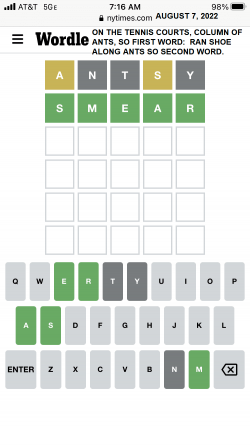ChemEngineer
Diamond Member
- Feb 5, 2019
- 6,776
- 6,670
- 1,940
- Banned
- #1
Although I am rather new to wordle, it is an interesting and addicting pastime. In only about two months, I have figured out the word of the day on my second guess. This led me to recall atheist-evolutionist, Richard Dawkins' total misuse of statistical analysis. I've read his books and found them fraught with errors of science and common sense. For example, Dawkins used a computer program to winnow down random keystrokes into forming the phrase, "Methinks it is a weasel."
Random mutations, however, have no direction. They don't think and use the process of elimination as a human does in Wordle. You guess five letters of a word found in the dictionary, and incorrect letters are shown in gray.
Correct letters are shown in gold. Correct letters in the correct location are shown in green.
Random mutations don't give colorful hints. They do nothing or they harm their host, possibly killing it and they don't give any directions on how to make things better the next time around. Other than that....
Dawkins doesn't care about reality, or science or statistics. He simply makes things up that gullible followers will swallow.
Here are the Darwinian numbers (space, or number of possibilities) for Wordle:
26 x 26 x 26 x 26 x 26 = 1 in 11,881,376 - First try
If it's wrong, random mutation learns nothing. It continues on apace so second try is:
26 x 26 x 26 x 26 x 26
How long would it take random placement of letters to solve any Wordle?
(There are ~70,000 five-letter words that are not proper nouns.)
Statistically, it would require ~11,881,000 tries. You only get six tries and you can almost always get the word in six.
On the tennis court recently, I saw a long row of ants and typed in
ANTSY. Close but then I saw letters that did not belong there and
dragged my foot along the row smashing hundreds of pesky ants in the process.
SMEAR came to mind with the constraints. Voila.
No thanks to Darwin.
Random mutations, however, have no direction. They don't think and use the process of elimination as a human does in Wordle. You guess five letters of a word found in the dictionary, and incorrect letters are shown in gray.
Correct letters are shown in gold. Correct letters in the correct location are shown in green.
Random mutations don't give colorful hints. They do nothing or they harm their host, possibly killing it and they don't give any directions on how to make things better the next time around. Other than that....
Dawkins doesn't care about reality, or science or statistics. He simply makes things up that gullible followers will swallow.
Here are the Darwinian numbers (space, or number of possibilities) for Wordle:
26 x 26 x 26 x 26 x 26 = 1 in 11,881,376 - First try
If it's wrong, random mutation learns nothing. It continues on apace so second try is:
26 x 26 x 26 x 26 x 26
How long would it take random placement of letters to solve any Wordle?
(There are ~70,000 five-letter words that are not proper nouns.)
Statistically, it would require ~11,881,000 tries. You only get six tries and you can almost always get the word in six.
On the tennis court recently, I saw a long row of ants and typed in
ANTSY. Close but then I saw letters that did not belong there and
dragged my foot along the row smashing hundreds of pesky ants in the process.
SMEAR came to mind with the constraints. Voila.
No thanks to Darwin.
Attachments
Last edited:




